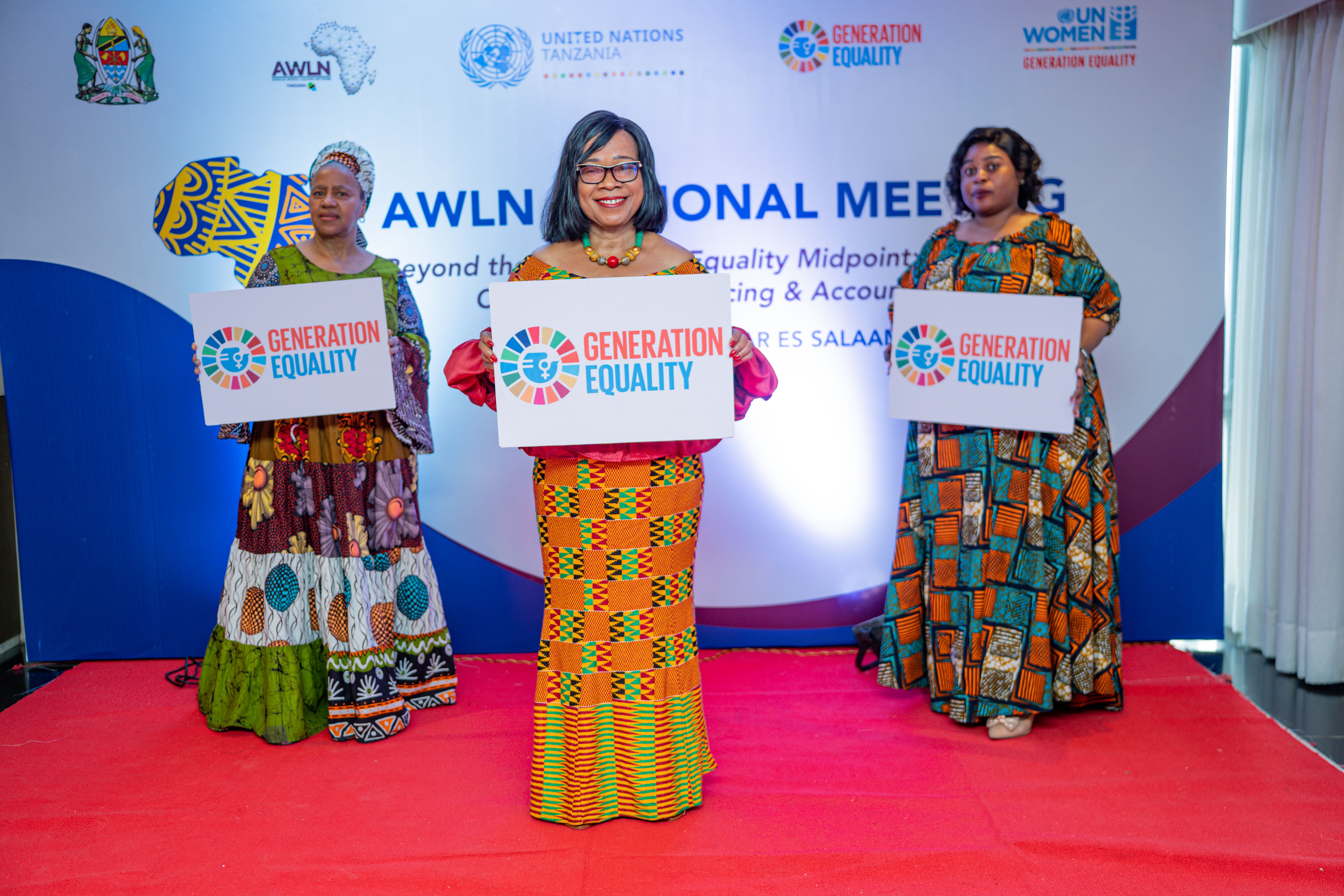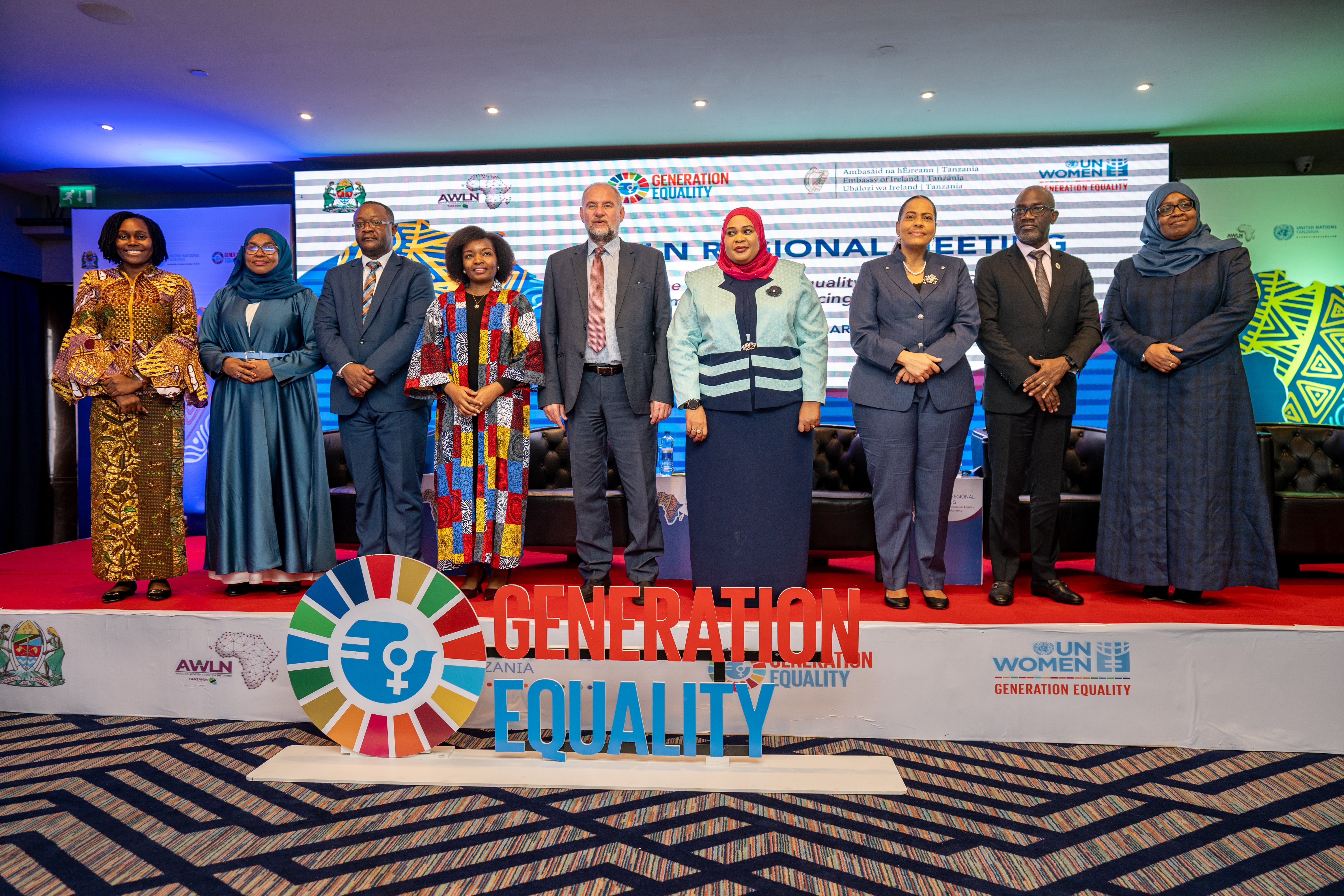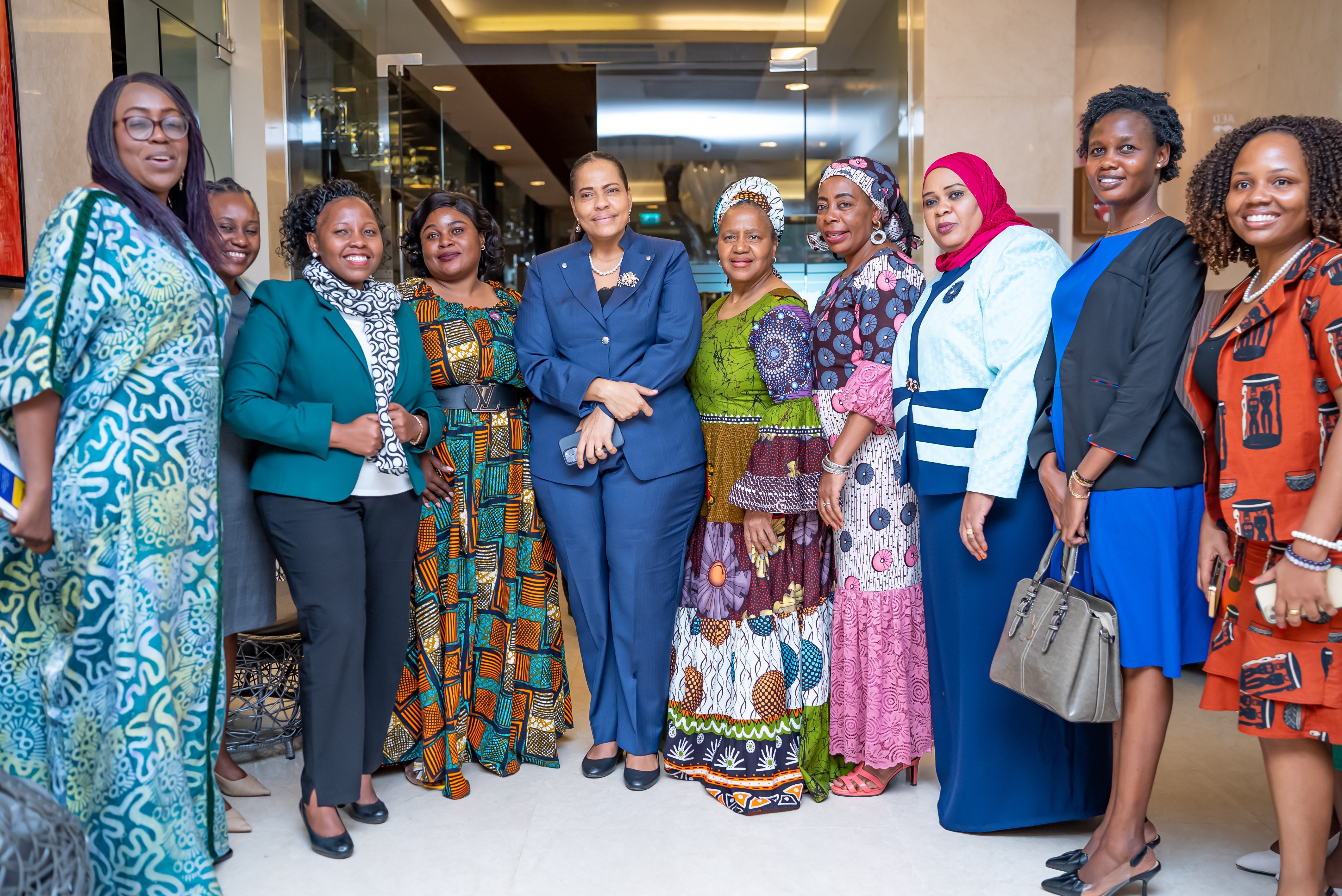Generation Equality: Stakeholders in Tanzania Galvanize Commitment, Financing and Accountability for Women’s Economic Justice and Rights
At a regional meeting held in Dar es Salaam, women leaders from the African Women Leaders Network (AWLN) and gender equality stakeholders called for actionable steps to increase financing for gender equality across the Sub-Saharan African region, emphasizing the need for policies and practices that promote accountability, inclusivity, and sustainable economic development for everyone.
Date:
The meeting, organized by the AWLN youth pillar in Tanzania and UN Women, alongside the Government of the United Republic of Tanzania through support from the Bill and Melinda Gates Foundation and the Embassy of Ireland in Tanzania, aimed to assess progress, solidify commitments, and harness the collective power of women's rights organizations and young people to accelerate implementation of pledges made at the 2021 Generation Equality Forum.

"Generation Equality has enabled discussions on feminist funding approaches and the exploration of new funding opportunities,” said Joyce Mends-Cole, Executive Director for the African Women Leaders Network in her remarks, highlighting the aspiration for the meeting to elevate the voices of women leaders across the continent to generate new energy and action to achieve gender equality.
Over 200 participants, including representatives from government, women's rights groups, climate activists, young feminists, disability advocates, private sector organizations and AWLN chapters across Africa attended the meeting, placing the spotlight on the urgent need for increased investment in gender equality as a critical accelerator for achieving the Sustainable Development Goals.
Addressing the financing gap for gender equality in Sub-Saharan Africa
The 2023 UN Women UN DESA Gender Snapshot report paints a sobering picture for Sub-Saharan Africa; showing that by 2030, 221 million women and girls might still be living on less than $2.15 a day; and half of the women in the region might still be grappling with food insecurity.
UN Women Tanzania Representative a.i., Peterson Magoola, emphasized in his opening remarks that these statistics are a reminder that the journey to gender equality is far from over.
"We continue to need sustained investment and collaborative efforts within and across nations to develop robust frameworks and innovative financing strategies," Mr. Magoola said. "Additionally, we must enhance and strengthen policies, planning, and budgeting processes at all levels to ensure greater accountability and effective service delivery that reaches women and girls."

Emphasizing the gap in gender financing, AWLN Tanzania Co-chair, Rebeca Gyumi, stated that only 1.9 percent of all funding for gender equality reaches women and girls.
"These numbers must change, and change fast, if we are to make any meaningful progress toward gender equality," said Ms. Gyumi, adding that to ensure accountability on Generation Equality commitments, there is a need to ensure that tracking and reporting systems are clear and accessible for those working at the grassroots level.
The Executive Director for the African Women Leaders Network, Joyce Mends-Cole, said that Generation Equality provides an instrumental platform to highlight the extensive and chronic financing gap for gender equality, both globally and in our region.
“Generation Equality has enabled discussions on feminist funding approaches and the exploration of new funding opportunities. I hope today's event will serve to generate new energy and action to achieve gender equality through intensified investment and accountability, elevating the voices of women leaders across the continent in support of this important cause.”
Beyond the midpoint - Tanzania's progress in advancing Generation Equality commitments
As a GEF Global Champion and co-leader of the Generation Equality Action Coalition on Economic Justice and Rights, Tanzania has made commitments under four action areas, focusing on increasing investments in gender-responsive public and private quality care services, expanding opportunities for decent work, enhancing access to productive resources, and implementing gender-responsive macroeconomic plans, budget reforms, and stimulus packages to significantly reduce the proportion of women living in poverty.

Speaking at the event, Angellah Kairuki, Minister for Natural Resources and Tourism and Chair of the Generation Equality Forum National Advisory Committee, shed light on the significant progress the country has made in fulfilling its Generation Equality commitments to advance women's economic justice and rights, from establishing a national advisory committee and a national Generation Equality programme and action plan, with multiple stakeholders contributing to results.
“In efforts to bridge the financial inclusion gap, for example, Tanzania recognized the need for innovative and transformative financing mechanisms, such as gender bonds, with one bank, led by a woman leader and member of the Generation Equality committee introducing the first gender bond in Sub-Saharan Africa,” said Minister Kairuki.
Highlighting progress across various sectors, Riziki Pembe Juma, Zanzibar Minister for Community Development, Gender, Elders and Children, outlined achievements the country has made since 2021 in education, energy, finance, water, health, agriculture, and entrepreneurship, as well as in strengthening policy frameworks and coordination mechanisms to support Tanzania's Generation Equality efforts.
“The Government of Tanzania has appointed and trained 234 Focal Persons specifically to oversee the implementation of the Tanzania Generation Equality strategy. This ensures the program benefits women, men, girls, boys, and other vulnerable groups from the national level to village levels. These Focal Persons are available in all sector ministries, regions, and local government authorities," said Minister Juma.
Charting the course forward to realize lasting change for women and girls
A Communiqué issued at the meeting emphasized the importance of collective action and financial commitments to achieve gender equality, with key recommendations focused on promoting gender-responsive budgeting, advocating for progressive tax policies, ensuring greater transparency in budget allocations for gender equality initiatives, and integrating climate change considerations into gender equality efforts.
The Communiqué further reinforced the necessity for long-term solutions including early childhood education initiatives that promote gender equality, fostering collaboration between men and women in gender equality efforts, and continued investment in financial inclusion programs for women and girls.

The inter-generational dialogue marked a critical step forward in advancing the Generation Equality agenda in the Sub-Saharan Africa region, ensuring the voices of women, and particularly young women continue to play a vital role in driving accountability towards a more equitable future for all.
"Having the policies, the money and an active women's movement does not guarantee Generation Equality," said Mmabatho Ramagoshi, Chair of AWLN South Africa, "We need to have the right accountability mechanisms in place so that we do not meet again in 2030 and have the same excuses."
For more information, please contact:
Hanna Mtango
Communications Analyst
UN Women Tanzania